- Home
- Madeleine Roux
Tomb of Ancients Page 13
Tomb of Ancients Read online
Page 13
There was no sign of Mrs. Haylam and her severe, iron-colored hair, always neatly in a bun, nor sound of her sharp voice. I heard only a rustling coming from the pantry to the left, and I rounded the tall table near the stoves, a place I had sat many, many times for meals. On good days at Coldthistle House, those meals had felt like family suppers, but now the kitchen was hollow with loneliness, the windows grimy and gray, as if the place had not heard laughter or cheer in years. A large, rough hole had been dug through the tiles near the door leading to the lawn, and when I drew closer, I could see it ran deep.
I found Lee in the pantry, his back to me, golden curls slicked back from his head with sweat as he feverishly stacked jars of dried goods. Those jars might have been far heavier, but most of them were only a quarter full. Lee whispered to himself, keeping a constant tally of what he shifted from the left side of the pantry to the right.
“Need help?” I was exhausted, but then, he seemed tired and harried, too.
Lee started, dropping the jar he was carrying, but only a few inches. Luckily, it did not shatter. I rushed forward and caught it before it could tip, righting the heavy crock of pickled green beans.
Lee blinked at me in the low light of the pantry. A single lantern had been placed on a shoulder-high shelf, making the left side of his face glow orange. “Are you often in the habit of rescuing young men and their beans?” he asked.
“Aye,” I said with a sad smile. “I feel gallant now.”
It had been almost two years since he swept my spoon out of the mud, but we had changed far more than two years warranted. That same spoon, I saw now—slightly bent from rough handling—was hanging around his neck, dangling out the open neck of his shirt.
Out of impulse or shock, he rocked toward me, pulling me into a tight embrace. I was glad for it and sighed with relief. Even road weary, I feared being alone with my thoughts. Father was quiet, but he could always return. There was going to be no pulling Mary and Chijioke apart for some time, and Khent had promised to keep an eye on Mother while I looked in on Lee. Dalton had agreed to apprise Mr. Morningside of all that had occurred between Sparrow’s attack and the present moment, a conversation that I had little interest in joining. The chilliness between them was palpable, and I was in no rush to tell Mr. Morningside I had been reading his friend’s personal accounts of their former adventures.
“I knew you would come back,” Lee said, pulling away and holding me at arm’s length. “You’ve come just in time, Louisa. Everything has gone upside down.”
“It’s the same in London,” I told him, taking the jar of beans and hoisting it onto his stack. “We were all but chased out of the city. I have no idea if the shepherd wanted to force us here or just to eliminate us altogether.”
“Us?” His eyes widened.
“Mary and Khent have come with me,” I told him. “And the spider, too, only it’s not a spider anymore but Father’s counterpart, and she’s called, well, Mother, obviously. Mr. Morningside’s old Upworlder friend has tagged along. He says he wants to help me get rid of Father’s spirit inside me, but I have no idea if that’s true.”
Perhaps I ought to take a page out of Dalton’s own diary and see if Bartholomew couldn’t divine his intentions. If only I had known the dog’s gift earlier, I might have saved myself a lot of trouble at Coldthistle.
“Goodness,” Lee murmured. “You had a busy summer.”
“So have you, from the looks of it,” I said.
“It was quiet for a while after you left,” he explained, sitting on the stack of jars and sighing. He ruffled his curls with one hand and leaned back. “But then it all went to hell. Birds all over the county started dropping dead. Figures started watching us from the property boundary, day and night you would see them standing there, waiting for something. Then, a fortnight ago, they began crossing over, and one almost carried Chijioke off. It’s horrible, Louisa, but I’m terribly glad you’re here. Mr. Morningside has not been himself . . .”
The way he gazed up at me, so expectantly, made me nauseated with fear. I couldn’t crush his expectations.
“He did look a bit peaky,” I said.
Lee shook his head, curls rustling. “No, no, it’s more than that. He’s cross with us all the time. I knew he could have a prodigious temper, but now we’re the target of it, too.”
“I’m sorry.” It was all I could think to say. “He’s in open conflict with the shepherd. He must be worried that he could lose.”
“But how?” Lee scratched thoughtfully at his chin. “He has hundreds of souls trapped in birds, and he must be powerful himself. I don’t understand why he hasn’t fought back, why he hasn’t made Mrs. Haylam raise shadows or some such.”
“I couldn’t possibly know his mind,” I said. But Lee had a point. Why was he waiting to mount a proper defense? I had never known Mr. Morningside to be meek or retreating, so why the sudden change? “Listen, Lee, I don’t know his mind, but I’ll do what I can to help. We all will. I just need to be careful. Father’s spirit is dangerous, and I frighten myself when he takes control. He’s out for blood.”
“Good,” Lee said, furrowing his brow. When we first met, I could never have imagined him becoming bloodthirsty, but death and living as a man of shadow had changed him. It would change anybody. “Those Upworlders are more than a nuisance. They won’t hesitate to hurt us. Why should we be any different?”
He had a point, of course, and I didn’t know what they had experienced in my absence, but I did know what it was like to be hounded and hunted.
“There may be a better way to solve this,” I said. “You might want bloodshed now, but trust me, you will quickly tire of it. Killing, even out of pure defense, it maims your spirit. Pull the wings off a butterfly, pull off its legs, and what do you have left?”
Lee stood, glowering, and pushed his way past me out of the pantry.
“Well, if you refuse to help us, maybe Khent and Mary will.”
“That’s not what I meant, Lee. I’m only advising caution. I . . . was responsible for Sparrow’s death. Nobody liked her, maybe, but it opened a wound in me all the same,” I said.
That slowed his steps, and he hung his head, shaking it.
“She is really gone?” he whispered. “I should be relieved to hear she’s gone. Just her very presence made me sick to my stomach, and she hated us, but . . . Damn it all.”
“I should look in on the others,” I said, walking slowly toward the open doorway to the foyer. “Mr. Morningside seems to be in a strange mood, and having another ancient god in the house with him makes me nervous.”
Lee hunched, gripping his stomach, wincing and stumbling forward until he could put one hand on the high table.
“What’s the matter?” I asked, going to him. His brow perspired. “Are you ill?”
“Upworlders,” he said through gritted teeth. “They’re near. I only feel that way when they come.”
“Dalton is one of them but estranged. Maybe you sense him in the house?”
“No, no. It’s too sharp to be just one of them. It feels more like when Finch and Sparrow first turned up together. They’re beings of light, Louisa, and I’m a creature of shadow now. Light pierces shadow. It’s torment when they’re stalking us.”
“Come,” I said, taking him gently by the arm. “We should tell the others. You don’t have to fight them on your own anymore. Our strength is yours.”
Chapter Seventeen
1247, The Road East
“What do you make of him?”
I’d done my level best to avoid Ara when I could. Henry was arguably more powerful and more dangerous, but Henry liked me. Or loved me. It depended on the day. Sometimes the hour. But Henry’s and my good-natured alliance against Ara’s—shall we say—testier nature shifted once Faraday joined us. He had shaken off the name Focalor, donning human clothes and human sandals, draping himself in a sand-colored smock and a beaded belt, a hood that shadowed his face, kohl smudged across his eyes.
He kept his injured hands deep inside his sleeves and wrapped linens over the places where his fingers were missing.
“I’ve had truck with shadows more solid than he is,” Ara said one night, crouching on a rug beside our fire. The road to Tuz Gölü was hilly but not unkind, and the passage of autumn into winter afforded us cooler climates for the journey. There was even a chill on the air that night, and I was grateful for the heat of the pup snuggled in my lap. “His heart is there”—Ara pounded her fist over her chest, leaving flecks of soot—“but it isn’t there, do you know what I mean?”
“What did Henry do to him?” I asked. “Besides the obvious . . .”
“He’s a thrall now—human, I suppose, but less than that. The book is what makes us, what allows and feeds our power, and maskim xul asked the Black Elbion to strip him bare.” She glanced over her shoulder at the two men, who watered the horses, deep in conversation. Or rather, Henry pelted Faraday with questions, and the other man shrank and mumbled. “Once a commander of dark legions, he will now be little more than a stableboy.”
I shuddered, eyes wandering to her pack and the heavy black book I knew lay within. “I hate when you call him that.”
“Why?” She cackled and stirred the cauldron on the fire. “Because it reminds you of his true self? Because it reminds you why you should sleep in your own tent?”
“It’s quite honestly none of your business, Ara, and it baffles me that you deign to care.”
The hand stirring the pot went still. “Watch your tone, Upworlder. You’re vastly outnumbered and far from home.”
I shrugged, well accustomed to her empty threats. While Henry remained near, she would not attempt anything. “You seem to know much about the books. Did Henry interrogate you, too?”
Ara went back to her cooking, adding a dash of something into the cauldron. “What I know, he knows. The only difference is that I have a healthy fear of the answers he so boldly seeks.”
“Focalor paid a steep price for his knowledge,” I pointed out. “I can only pray we won’t owe the same.”
“We will, and worse,” she said. “Focalor is a fool, and he paid only a fool’s price. Henry should know better than to chase this rabbit, and so he will follow it down the hole and never come back out.”
Henry’s voice suddenly rose, but I could not make out the words. His brows were knit with anger, and he used his height to loom over Faraday, trapping him against a large stone outcropping. I couldn’t help taking pity on the poor sod, and I shuffled Bartholomew off my lap, excused myself, and crossed the camp to where the two men stood.
“So she asked you that and you said what?”
“I . . . I could not think of the answer, and she . . . Oh, but it was horrible.” Faraday shivered against the rock and stuffed his hands deeper into his sleeves.
“My word, you’re simple. But then demons usually are. It’s not even that hard of a riddle. Moving on. What was the next question?”
“Henry, the food is practically finished. Could you not allow him a moment to recover?”
He shot me a silencing glare and put his hand on the rock next to Faraday’s head, leaning in. The poor man looked like he might tremble to pieces. “The next riddle—what was it?”
“A-Arms to embrace, yet no hands,” Faraday stammered, swallowing hard. “Pinches to give, yet no fingers. Poison to wield, yet no needle.”
“Please tell me you managed to get that one,” Henry muttered. “Please.”
“I—I did.” Faraday shook his head, turning to me with a pleading look. “At least, I thought I did. How could it be the wrong answer? She asked, and I was so sure! Then she bit me. And it went on and on. I didn’t know the others, but she wouldn’t stop. More questions! More . . . more biting. I think . . . Oh, I think she enjoyed watching me struggle. No. No! We are too close to the salt. We should not even be speaking of this. I mustn’t speak the word.”
But Henry sighed, clucking his tongue. “Shall I fetch the book?”
“Henry. Please.” I was well beyond exasperation. This was torture, and the former demon was leading us to the salt and seemed to be cooperating with Henry’s questions. It was horrid enough thinking about bringing him back to the place where he had lost so much, and Henry could not spare even an ounce of pity for the creature.
“Tell me what you answered, and I will . . . I’ll let you eat,” Henry muttered, then curled his lip in my direction. “Happy?”
“Not exactly.”
Faraday’s sleeves rippled, and I could imagine him gripping his own arms with what remained of his fingers. At least we could stop this torment in a moment, and I vowed silently to try to protect Faraday from Henry’s prodding. The irony of it—an Upworlder shielding a demon from his own master!
Though I had to admit, I was somewhat curious . . . The riddle’s key seemed obvious enough to me, and I possess no aptitude for puzzles. They had been speaking in Greek for my benefit, but Faraday fell back on his native tongue, sweating as he cowered against the rock and spoke. I felt the wind come and shake the grass and trees even before he answered.
“Zuqaqīpu,” he whispered.
“Scorpion,” said Henry, for my benefit.
“What are you doing!?” Ara leapt up from the fire, upsetting the cauldron and sending stew cascading over the hissing coals. Her robes flowed around her as she ran toward us, still wielding the long wooden cooking spoon. “I told you to be careful. I told you.”
Faraday was right. We were too close to the salt, and the scorpion’s malevolent presence seemed to prove that he had indeed unearthed something monstrous there. I heard him cry out and fall to the ground as the harsh, hot wind whipped through the camp, sending sand, dust, and grit into our eyes as it all but sliced us up. The rumbling began after that, a sound like the earth belching forth the flames of a volcano. The explosion had sounded distant, but that didn’t matter. I could already hear whatever the underworld had birthed moving swiftly toward us, obliterating the sands as it came.
“Abātu! Go! Now! If we are lucky, we can outrun it and lose it in the hills. It will take time for me to summon shadows, but all is not lost!” Ara looped back toward the camp, frantic, scooping up her pack and tossing Henry’s to him. I grabbed Faraday by the arm and hoisted him to his feet, pulling him along while he wept and apologized. Bartholomew paced at the ruined fire, and I took him up, too, letting Henry manage both of our packs as the four of us made for the road.
“It doesn’t matter,” I heard Faraday moan. “It’s coming. It’s already here.”
We scrambled up the road, running east. The moon was obscured by heavy clouds, and without any light to see by, it was a blind retreat, but the path cut through two hilly clusters of land, thick with shrubs and trees. Ara ran ahead; even burdened by the book, she overtook us, and we followed her up the pass to the right. At last, Faraday found some strength in his limbs and climbed next to me, whispering nonsense to himself as the great rumbling strides of the creature behind us neared. It sounded like more than one enemy, but my only intent was to climb. We could face our doom when we had the high ground.
The rocks cut into my palms, and the dense shrubs, bushy and sharp with thorns, tore at my tunic. The pain was forgotten, pushed aside by the pounding in my chest. The hilltop was no mountain, but it provided ample places to hide and a vantage. Ara made it first, running only a few steps more before she dropped to her knees and hoisted the Black Elbion out of her bag. It was her turn to whisper, using the ancient language she and Henry and the demon favored. I saw the book shake on the ground as I crested the hill, its pages rustling, the bushes around us suddenly full of secretive sounds, as if the very shadows had come alive.
In fact, they had.
I herded the dog against my stomach and curled around it on the ground. Henry was not at all put off by the noises bubbling up from every direction, and instead he strode to the edge of the cliff, leaning over to watch the thing that had followed.
“It’s hideous,�
� he hissed. “Ara, darling, we have to hurry now.”
She shushed him, impatient, her hands waving over the book, her voice a low, rasped music that rose and fell. The rocks under us swayed. The creature was ramming itself against the base of the hill, apparently unable to climb. Just above Ara’s song, I heard the creature’s eerie chattering.
“I knew not to speak of it, I knew, I knew . . .” Faraday hugged himself, rocking back and forth in the dirt beside me.
“Hush,” I told him. “Let her concentrate.”
I had never seen Ara at work, but it was a thing of strange beauty. As her song reached its peak, she produced a knife from inside her robes and slashed at her hand. She made a fist, as if to hold the blood there, and then threw it outward in a fan. The blood never hit the ground, hovering there in the air before the shadows seethed out of the bushes to consume the offering. Her blood gave them form, and soon a dozen or so faces of shifting black stared at her, as if the night itself had come to life to do her bidding.
“Addāniqa—hisnu, hisnu!” she commanded, waving her arms frantically.
I didn’t speak the language perfectly, but I knew what she had asked—protection. Please, protection.
With dragging feet, the shadows rushed by in single file and vanished over the edge of the hill, moving with silent, unnatural speed. I crept to my knees and then stood, joining Henry at the ledge. Ara remained on the ground, holding her wounded hand to her chest and breathing deep.
“They can only be a distraction,” Henry said, somber.
“What is it?” I asked him. “What pursues us?”
His eyes gleamed even in the total darkness as he turned away from the edge. There was a guilty hunch to his shoulders. Perhaps—finally—he had realized the cost of this quest. “I’ve never seen anything like it before, love. We will need all of our courage for what is to come.”
Lee’s upset stomach proved prophetic. After alerting Mr. Morningside and Dalton to the possible presence of Upworlders on the property, we mustered on top of the east tower, in one of the dusty, rarely used bedrooms that had been draped with cloths to keep the moths and dirt at bay. The furniture shrouded, the floors bare of carpets, it felt like a suitably desolate setting for what we found outside.

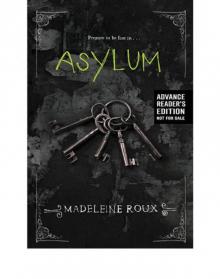 Asylum
Asylum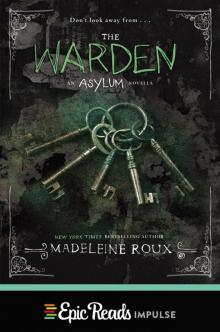 The Warden
The Warden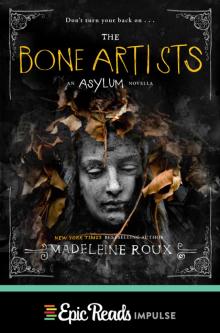 The Bone Artists
The Bone Artists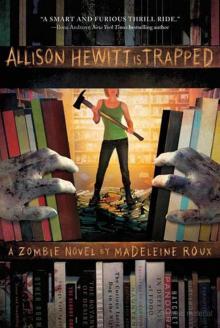 Allison Hewitt Is Trapped
Allison Hewitt Is Trapped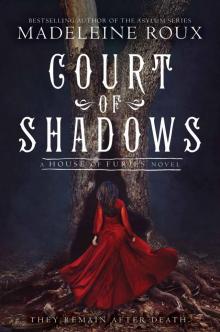 Court of Shadows
Court of Shadows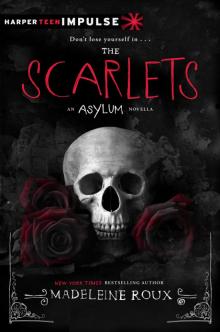 The Scarlets
The Scarlets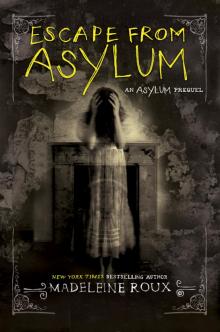 Escape From Asylum
Escape From Asylum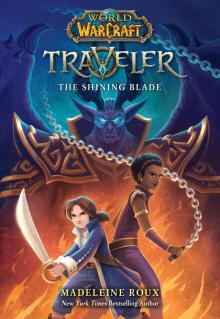 The Shining Blade
The Shining Blade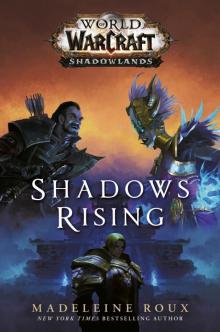 Shadows Rising (World of Warcraft: Shadowlands)
Shadows Rising (World of Warcraft: Shadowlands)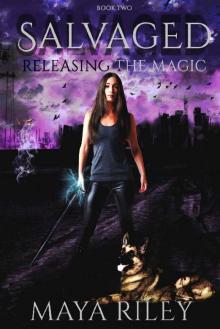 Salvaged
Salvaged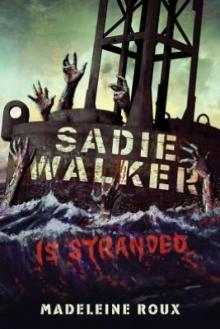 Sadie Walker Is Stranded
Sadie Walker Is Stranded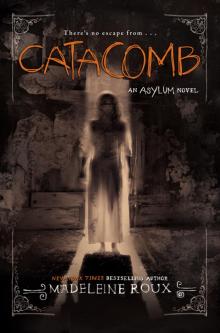 Catacomb
Catacomb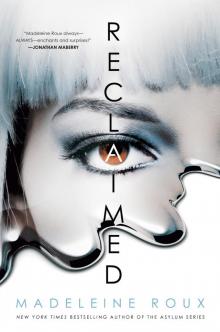 Reclaimed
Reclaimed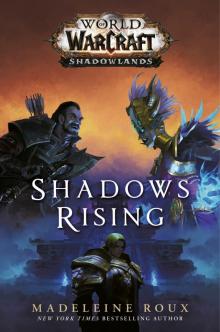 Shadows Rising (World of Warcraft
Shadows Rising (World of Warcraft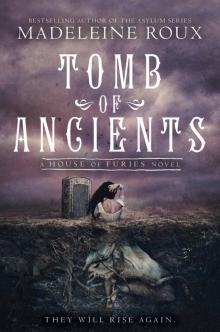 Tomb of Ancients
Tomb of Ancients